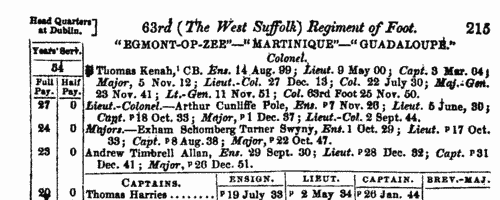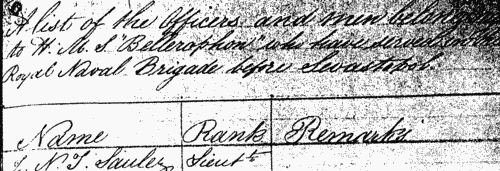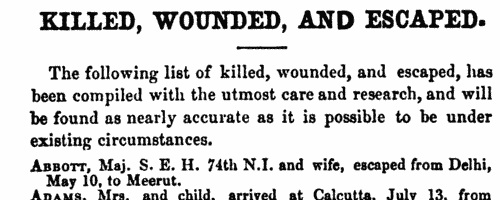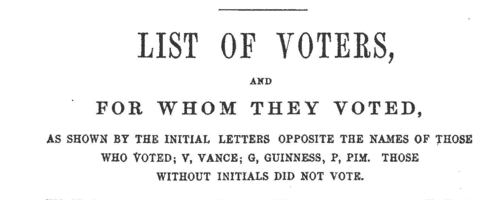Supple Surname Ancestry ResultsOur indexes 1000-1999 include entries for the spelling 'supple'. In the period you have requested, we have the following 78 records (displaying 41 to 50): Single Surname Subscription | | | Buying all 78 results of this search individually would cost £428.00. But you can have free access to all 78 records for a year, to view, to save and print, for £100. Save £328.00. More... |
These sample scans are from the original record. You will get scans of the full pages or articles where the surname you searched for has been found. Your web browser may prevent the sample windows from opening; in this case please change your browser settings to allow pop-up windows from this site. British Army Officers
(1853)
The 14th volume of the New Annual Army List, for 1853, corrected to 30 December 1852, was published by Major H. G. Hart of the 49th Regiment. It contained 'the dates of commissions, and a statement of the war services and wounds of nearly every officer in the Army, Ordnance and Marines'. The first section, pages 1 to 111, lists officers of the rank of major and above in order of rank and precedence; officers with local rank (112-114); Yeomen of the Guard (115); the Honourable Corps of Gentlemen-at-Arms (116); Headquarters Staff (117); and then (as in the scan) all the regiments and units in order of precedence, giving any regimental honours, with all the officers by rank, and details of postings, facings and agents (118-336). A long section (337-426) then lists officers on the retired full pay and half-pay, including the Royal Regiment of Artillery, Corps of Royal Engineers, Royal Marines and military departments. Then there are lists of officers in the Commissariat Department, the Medical Department, Veterinary Surgeons and the Chaplains Department. A section of Officers on the Foreign Half-Pay gives lists for the German Legion and Miscellaneous Corps (Brunswick Cavalry, Brunswick Infantry, Chasseurs Britanniques, Royal Corsican Rangers, Dillon's Regiment, Greek Light Infantry, Royal Malta Regiment, Meuron's Regiment, Roll's Regiment, Sicilian Regiment, Watteville's Regiment, York Light Infantry Volunteers, the Foreign Veteran Battalion, and the Foreign Corps of Waggoners). After lists of officers in garrisons and military establishments, there are sections listing officers holding Gold Decorations for their parts in various important actions and other British decorations, and those holding medals bestowed by foreign powers. SUPPLE. Cost: £4.00.  | Sample scan, click to enlarge

| Petitioning Creditors and Solicitors
(1854)
Principal creditors petitioning to force a bankruptcy (but often close relatives of the bankrupt helping to protect his assets): and solicitors: in England and WalesSUPPLE. Cost: £6.00.  | Sample scan, click to enlarge

|  Sailors of H. M. S. Bellerophon who fought at Inkerman
(1854) Sailors of H. M. S. Bellerophon who fought at Inkerman
(1854)
Sebastopol in the Crimea was the great Russian naval arsenal on the Black Sea. A combined assault by British, French and Turkish troops resulted in the reduction of Sebastopol and led to the Treaty of Paris of 27 April 1856, guaranteeing the independence of the Ottoman Empire. By Admiralty Order the Crimea Medal was awarded to sailors and marines present during the campaign, between 17 September 1854 (the first landing at Eupatoria) and 9 September 1855 (when the allies secured Sebastopol). Her Majesty's Ship Bellerophon, a 78-gun sailing ship, took part in the assault. Four clasps to this medal were awarded to the men present in the actions at Sebastopol itself, Inkerman, Balaklave (Balaclava) and (the sea of) Azoff. This is the roll for the sailors of the ship actually present at the battle of Inkerman, on 5 November 1854, where the Russian troops made an ultimately unsuccessful attack on the allied army.SUPPLE. Cost: £8.00.  | Sample scan, click to enlarge

|  Sailors and marines on H. M. S. Bellerophon in the Crimean War
(1854-1856) Sailors and marines on H. M. S. Bellerophon in the Crimean War
(1854-1856)
Sebastopol in the Crimea was the great Russian naval arsenal on the Black Sea. A combined assault by British, French and Turkish troops resulted in the reduction of Sebastopol and led to the Treaty of Paris of 27 April 1856, guaranteeing the independence of the Ottoman Empire. By Admiralty Order the Crimea Medal was awarded to sailors and marines present during the campaign, between 17 September 1854 (the first landing at Eupatoria) and 9 September 1855 (when the allies secured Sebastopol). The sailors' medals were mostly delivered to them on board ship in the course of 1856; the marines' medals were sent to their respective headquarters for distribution. The remarks as to distribution in this medal roll therefore give more specific information as to the whereabouts of the sailor recipients in 1856 than about the marines. Her Majesty's Ship Bellerophon, a 78-gun sailing ship, took part in the assault. Four clasps to this medal were awarded to the men present in the actions at Sebastopol itself, Inkerman, Balaklave (Balaclava) and (the sea of) Azoff, but the recipients of these clasps are recorded on separate rolls, not part of this index, but indexed on this site.SUPPLE. Cost: £8.00.  | Sample scan, click to enlarge

|  Sailors of H. M. S. Bellerophon who fought at Sebastopol
(1854-1856) Sailors of H. M. S. Bellerophon who fought at Sebastopol
(1854-1856)
Sebastopol in the Crimea was the great Russian naval arsenal on the Black Sea. A combined assault by British, French and Turkish troops resulted in the reduction of Sebastopol and led to the Treaty of Paris of 27 April 1856, guaranteeing the independence of the Ottoman Empire. By Admiralty Order the Crimea Medal was awarded to sailors and marines present during the campaign, between 17 September 1854 (the first landing at Eupatoria) and 9 September 1855 (when the allies secured Sebastopol). Her Majesty's Ship Bellerophon, a 78-gun sailing ship, took part in the assault. Four clasps to this medal were awarded to the men present in the actions at Sebastopol itself, Inkerman, Balaklave (Balaclava) and (the sea of) Azoff. Here we have the list of the men from the ship who served as part of the naval brigade that actually fought at Sebastopol (Sevastopol, Sevastapol).SUPPLE. Cost: £8.00.  | Sample scan, click to enlarge

|  London Policemen
(1843-1857) London Policemen
(1843-1857)
The Metropolitan Police Register of Joiners (MEPO 4/334) lists policemen joining the force 1 January 1843 to 1 April 1857 (warrant numbers 19893 to 35804). The register is alphabetical, in so far as the recruits are listed chronologically grouped under first letter of surname. It gives Date of Appointment, Name, Number of Warrant, Cause of Removal from Force (resigned, dismissed, promoted or died), and Date of Removal. Although the register was closed for new entrants at the end of 1842, the details of removals were always recorded, some being twenty or more years later. Those recruits not formerly in the police, the army, or some government department, were required to provide (normally) at least two letters of recommendation from persons of standing, and details of these are entered on the facing pages: the names in these are indexed separately - this index refers only to the police constables. Where a recruit was only recently arrived in the metropolis, the names and addresses of the recommenders can be invaluable for tracing where he came from.SUPPLE. Cost: £8.00.  | Sample scan, click to enlarge

|  Sailors and marines awarded the Baltic Medal
(1854-1857) Sailors and marines awarded the Baltic Medal
(1854-1857)
During the Crimean War, a British and French fleet entered the Baltic, and captured Bomarsund harbour and one of the Aland Islands (now part of Finland). Bomarsund is the sound between the islands and the Swedish island of Vardo; and at the fine harbour on Bomarsund, dominating the entrance of the Gulf of Bothnia, and indirectly that of the Gulf of Finland, the Russians had constructed a northern naval base, and this was destroyed in the attack. The British fleet taking part in the Baltic expedition comprised Her Majesty's ships Aeolus, Ajax, Alban, Algiers, Amphion, Archer, Arrogant, Basilisk, Belleisle, Blenheim, Boscawen, Bulldog, Caesar, Calcutta, Centaur, Colossus, Conflict, Cornwallis, Cossack, Cressy, Cruizer, Cuckoo, Cumberland, Dauntless, Desperate, Dragon, Driver, Duke of Wellington, Edinburgh, Esk, Euryalus, Exmouth, Falcon, Firefly, Geyser, Gladiator, Gorgon, Hannibal, Harrier, Hastings, Hawke, Hecla, Hogue, Imperieuse, James Watt, Leopard, Lightning, Locust, Magicienne, Majestic, Merlin, Miranda, Monarch, Neptune, Nile, Odin, Orion, Otter, Pembroke, Penelope, Pigmy, Porcupine, Prince Regent, Princess Royal, Pylades, Resistance, Retribution, Rhadamanthus, Rosamond, Royal George, Royal William, Russell, St George, St Jean D'Acre, St Vincent, Sphinx, Stromboli, Tartar, Termagant, Tribune, Tyne, Valorous, Volage, Volcano, Vulture, Wrangler and Zephyr. This is the medal roll of the naval and marine claimants who qualified for the Baltic Medal for service in 1854 to 1855. The medals were dispatched in batches from early 1857, the first batch being numbered B A 1, the next B A 2, &c.; then follows the destination (a place or, more usually, a ship) and the date of dispatch. Most of the medals had been sent by the end of 1857.SUPPLE. Cost: £8.00.  | Sample scan, click to enlarge

| Indian Mutiny: Killed, Wounded and Escaped
(1857)
This list of casualties of the Indian Mutiny was published 17 September 1857.SUPPLE. Cost: £4.00.  | Sample scan, click to enlarge

|  British infantry fighting in China
(1856-1860) British infantry fighting in China
(1856-1860)
The China Medal was awarded to soldiers and sailors who took part in the prosecution of the war against the Chinese from 1856 to 1860. Separate clasps were awarded for men who had been in receipt of the China Medal of 1842; for being actually present at Canton on 28 and 29 December 1857, when that city was bombarded and finally captured; for being actually engaged in the operations which ceased with the first capture of the Taku Forts, 20 May 1858, and led to the Treaty of Tientsin; for being actually present at the capture of the Taku Forts 21 August 1860; and for being actually present before Pekin the day the gate of that city was given up to the allied (British and French) army, viz. on 13 October 1860. The 67th (The South Hampshire) Regiment of Foot, based at Athlone, embarked for India 18 September 1858, and was transferred to China in 1859, taking part in the capture of the Taku Forts and Pekin, and the operations against the Taiping rebels in 1862 to 1863: the right wing was moved to Japan in 1864 for the occupation of Yokohama. The regiment returned to the Cape of Good Hope in 1865, and back to Ireland in 1866.SUPPLE. Cost: £8.00.  | Sample scan, click to enlarge

| Dublin Electors
(1865)
This alphabetical list of electors for the City of Dublin for 1865 is annotated with details of the votes cast in the election of 15 July 1865 for a member of Parliament. The candidates were John Vance, Esq., D. L. (V), Benjamin Lee Guinness, Esq., D. L., LL. D. (G), and Jonathan Pim, Esq. (P). The first column gives, in bold, the initial of the ward in which lay the property that was the elector's qualification. The second column gives the elector's sequential number (alphabetically) within that ward. Then the elector's full name is given, surname first, and address, usually including house number. The votes cast are shown on the right: where these columns are blank, the elector did not vote. The key to the ward names is: A, South Dock; B, Donnybrook; C, Rathdown; D, Trinity; E, South City; F, Royal Exchange; G, Mansion House; H, Fitzwilliam; I, Wood Quay; K, Merchants' Quay; L, Usher's Quay; M, Arran Quay; N, Inns' Quay; O, North City; P, Rotundo; Q, Mountjoy; R; North Dock. S indicates the register of freemen.SUPPLE. Cost: £4.00.  | Sample scan, click to enlarge

|
Research your ancestry, family history, genealogy and one-name study by direct access to original records and archives indexed by surname.
|













